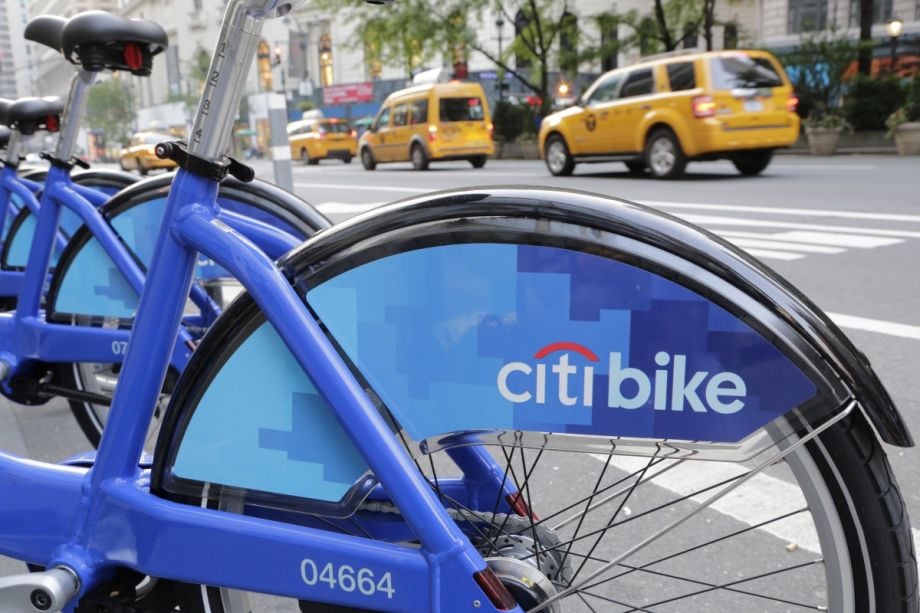On Monday, everyone in the biking world got understandably excited about Fast Company’s report that Motivate, the world’s largest bike-share company, was going to “start manufacturing bicycles in the U.S.” Thrilled at the prospect of made-in-the-USA bike-share bikes, people shared the article far and wide on social media and blogs. This is good news — the deal means new jobs for Detroit’s bike industry — but there’s also reason for measured enthusiasm.
Motivate operates bike-share systems in New York, Boston, Washington, D.C., Seattle, Chicago and many other cities. They announced via press release and blog post that the company’s bikes are now “designed and engineered” in the U.S. and will be assembled in Detroit by workers at Detroit Bikes, one of the few companies manufacturing its own line of bikes in the U.S from metal tubes to finished product.
But Motivate spokeswoman Dani Simons tells me that the bike frames are still being manufactured in Asia and shipped along with parts to Detroit Bikes where workers there will attach the components to the frame and build the wheels. Another company in Detroit will paint the frames in their respective bike-share system colors. Prior to this, Motivate purchased its bikes from a Canadian supplier Devinci, and Simons says she can’t speak to where they were designed and engineered.
According to Pronto Bike-Share General Manager Demi Allen, their bikes arrive in large shipping crates essentially fully assembled. The bike-share mechanics just have to attach the front wheel and straighten the handle bar.
Ursula Sandstrom, a former Capital Bikeshare worker says, “They would come looking like bikes, but you definitely had to put some work into them to get them up to bike-share standards rather than factory.”
It may sound like splitting hairs, but there is a difference between assembly and manufacturing — the two are decidedly different roles in the bike industry and command different wages.
Bike assembly is a standard job for an entry-level bike shop mechanic, which earns a median salary of about $27,000 according to the Bureau of Labor Statistics. Salary data for frame builders is harder to come by, but it is a higher-skilled position that requires welding tubing together to make the frame. It’s not an apples-to-apples comparison, but BLS says the median welder salary is $38,100.
Still, Motivate’s assembly contract is creating jobs. Detroit Bikes hired 10 new workers to get the first order of 3,000 bike assemblies completed.
“We’re really happy about it,” Simons says. “It’s still small compared to other industries, but we’re creating green collar jobs.”
And Zak Pashak, founder of Detroit Bikes, told Crain’s he “hopes he’s bettered his chances of winning a bid for a Detroit bike-sharing program” because of the Motivate contract.
The Detroit assembly plan came about as part of Motivate’s broader redesign of their bike-share fleet. The bikes still fundamentally look like the bike-share bikes we’re accustomed to, but Simons says they’ve made improvements to the new line. First, they’ve changed the gear ratios (how hard or easy a gear riders can select) to both allow for a little more speed on flat ground and easier pedaling up hills. They made the taillight larger for better visibility at night. And they’ve added a cutout in the seat to allow water to drain. Pooling water was especially a problem in colder climates where it would freeze and sometimes crack the seats.
I asked Simons if some day they might consider bringing the full manufacturing process back to the U.S.
“Right now we’re working with Detroit Bikes on this first project,” she explains. “We’ll see how far that goes and where it might go from there … We think it’s cool to bring more of this process back to the U.S. and especially Detroit that has such a deep connection to U.S. mobility.”
The Works is made possible with the support of the Surdna Foundation.

Josh Cohen is Crosscut’s city reporter covering Seattle government, politics and the issues that shape life in the city.
Follow Josh .(JavaScript must be enabled to view this email address)






_600_350_80_s_c1.JPEG)










